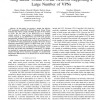Free Online Productivity Tools
i2Speak
i2Symbol
i2OCR
iTex2Img
iWeb2Print
iWeb2Shot
i2Type
iPdf2Split
iPdf2Merge
i2Bopomofo
i2Arabic
i2Style
i2Image
i2PDF
iLatex2Rtf
Sci2ools
ICN
2007
Springer
2007
Springer
Ring-Based Virtual Private Network Supporting a Large Number of VPNs
— In this paper, we propose a simple but effective VPN mechanism called RING-VPN (Ring-based Virtual Private Network) that realizes a high scalability in terms of the number of VPNs. The key idea of our RING-VPN is to logically connect nodes in a ring topology for minimizing the number of IPsec tunnels. In our RING-VPN, each VPN node operates autonomously, making VPNs robust even in case of node and/or link failures. We also quantitatively evaluate the performance of our RING-VPN using mathematical analysis. We derive several important performance metrics of RING-VPN, such as VPN construction time, and VPN recovery time, as well as user-level performance metrics, such as minimum TCP throughput, roundtrip time and packet loss probability. Furthermore, we validate our analysis by comparing numerical examples with simulation results. Through several numerical examples, we quantitatively demonstrate effectiveness of our RING-VPN in several network configurations.
| Added | 08 Jun 2010 |
| Updated | 08 Jun 2010 |
| Type | Conference |
| Year | 2007 |
| Where | ICN |
| Authors | Osamu Honda, Hiroyuki Ohsaki, Makoto Imase, Kazuhiro Matsuda |
Comments (0)

